| Construction Rating: | starstarstarstarstar_border |
| Flight Rating: | starstarstarstarstar |
| Overall Rating: | starstarstarstarstar_border |
| Diameter: | 1.64 inches |
| Length: | 18.20 inches |
| Manufacturer: | Dr. Zooch  |
| Skill Level: | 4 |
| Style: | Scale |
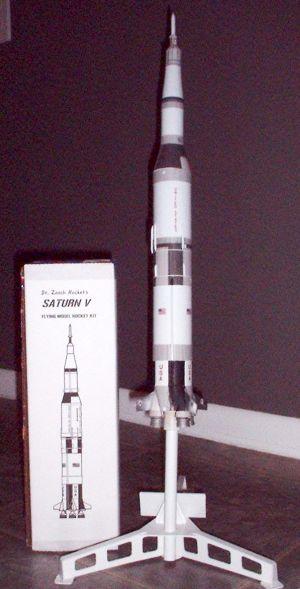
Brief:
Described as "ant scale", you get an amazing amount of scale detail
for such a small rocket and small budget. Saturn fans will love just about any
one of the Dr. Zooch fleet.
Construction:
When the $25 box arrives, you might initially be put off a bit. After all, this
thing comes in a measly 4"x4"x12" box. After unpacking it
though, you'll find a lot of parts and details packed into this box. Plus,
after building it, you can still fit the rocket back into this box with some
padding, so it makes a very good storage box.
Parts list includes:
- BT-60 body tube (S-IC/S-II)
- Balsa transition
- BT-50 upper body tube (S-IVB)
- Balsa transition (pre-weighted)
- BT-20 fairing tube
- 18mm motor mount kit (with hook and 20/60 centering rings)
- Cardstock wraps (pre-printed roll patterns)
- 3/32" balsa stock and assorted balsa/hardwood trim pieces
- Waterslide decals
- "Recovery package" consisting of Kevlar® shroud lines, snap swivel, and white garbage bag chute.
My particular kit was missing the balsa stock, which I easily covered from my scrap pile. (I was offered a free replacement right away but declined it.) You will either love or hate the Dr. Zooch instructions. There is no neutral ground. They are loaded with lots of dry wit and bitter sarcasm and are definitely aimed at the experienced builder. There's nothing else out there even close to these. Personally, I loved reading the instructions almost as much as building the kit, but I suspect that some folks would just not appreciate the irreverence. A very common theme, when describing some of the tricky steps necessary to pull off the illusion of detail and scale is "but who really cares--your rocket will be too fast/too high up/caught in a tree anyway, so no one will see the details." Beyond the tone, the instructions are generally well written, contain decent illustrations, and are easy to follow. (This was my 2nd Dr. Zooch kit, so I benefited from prior experience too.)
Construction starts with a standard motor mount assembly, consisting of an 18mm tube, engine hook, and a pair of 20/60 centering rings. The hook is taped on. For durability, I prefer to also lay down a bead of glue, as I've had mounts blow back out the aft end when held in place with only masking tape. The completed assembly is then glued into the BT-60 body tube.
Next, there's a pretty good suggestion to paint the main components white. I followed through with this, although I would suggest a couple of minor enhancements. First, the lower balsa transition is covered with a wrap so paint (and grain filling) is not needed on that part. Second, the tower uses a wood dowel that could also be painted at this point.
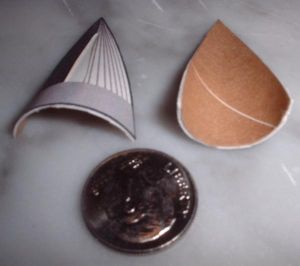 Then you move
on to construction of the fairings. This uses an incredibly cool technique to
get a beautiful effect. First, you cut out cardstock wraps and bond them to a
BT-20 tube. Next, you carve them out of the tubing. With only a minor amount of
additional curling, you have got a nice curved fairing that is much stronger
than a cardstock shroud. The pre-printed patterns also eliminate one of the
more challenging aspects of the paint job.
Then you move
on to construction of the fairings. This uses an incredibly cool technique to
get a beautiful effect. First, you cut out cardstock wraps and bond them to a
BT-20 tube. Next, you carve them out of the tubing. With only a minor amount of
additional curling, you have got a nice curved fairing that is much stronger
than a cardstock shroud. The pre-printed patterns also eliminate one of the
more challenging aspects of the paint job.
Building the lower transition (S-II/S-IVB adaptor to you Saturn buffs) is next. This is a simple assembly consisting of a balsa transition and BT-50 tube. The transition gets a cardstock shroud bonded to it, eliminating another paint job. This was a big relief, as the balsa filling would have set me back a couple hours at least, given the rough grain on it.
The next step covers attaching the wraps to the body tubes. I found the dimensions on the wraps to be very accurate and I did not have to trim away much excess. My seams are virtually invisible as well. The instructions clearly call out for white glue and this is very valuable advice. Yellow glue will shrink and tends to discolor the paper a bit. One aspect of the wraps that I found disappointing, despite being incredibly detailed right down to the corrugations and other markings, is no advise on orientation or efforts to cover seam lines. Most folks who've built a Saturn will understand what I mean by wanting to locate the position 1, position 2, etc. lines. I mistakenly assumed all seams run along the same line, and wound up having to mount an SII cable tunnel over a neat little yellow hatch at the end. I'd like to at least see an orientation guide and ideally remap the patterns to try to hide seam lines behind things like cable tunnels. After the wraps have bonded, the fairings are attached to the lower body. This is where a little extra rolling was necessary to fit to the pattern.
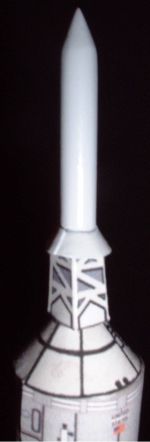 The Apollo
spacecraft is built starting with a balsa transition (BT50-BT20), a little
wooden dowel already sanded to a tapered point, a cardstock wrap to eliminate
the silver paint and tiny lines, and a cardstock shroud to form the escape
tower base. No problems at all on fit. This company really nails down all the
dimensions accurately.
The Apollo
spacecraft is built starting with a balsa transition (BT50-BT20), a little
wooden dowel already sanded to a tapered point, a cardstock wrap to eliminate
the silver paint and tiny lines, and a cardstock shroud to form the escape
tower base. No problems at all on fit. This company really nails down all the
dimensions accurately.
Unlike the Saturn 1 kit I warmed up with, which offered the builder the option of making a tower by cutting tiny pieces and tacking them together by hand versus a short-cut cardstock wrap, this kit offers up just the wrap. For most builders this is fine, but I kind of missed the opportunity to go blind again making a more realistic tower.
Fins are cut from 3/32" balsa. If you are a scale nut, then you will notice the fins are slightly oversized. This is a common approach to solving the inherent stability problem, as going oversized reduces the amount of nose weight needed for a safe flight. After sanding down beveled edges, I sealed them and applied a couple of coats of Testor's steel paint, followed by attaching them to the fairings. NOTE: Either mask the root edge or sand off the paint for better adhesion.
I'm not sure why this is called out here, rather than after attaching the wraps, but the instructions note to paint in the black roll pattern section between the lower and middle wraps, as well as painting solid the lower portion that has ribs on the pattern sheet. I would have preferred to see this done with another "wrap" or cardstock section, as the combination of solid/black paint and pre-printed black patterns farther up doesn't match that well. Still, I think I'm holding this $25 kit up to $100 standards, most of which it meets along the way. After painting, you can apply the position marker "decals" (since the decals are black on a white background, you get to cut them out from the plain paper instruction sheet).
Next up is attaching the engine nozzles, which was a bit tricky since the engine nozzles aren't actually made for another page or two...
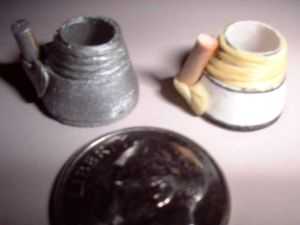
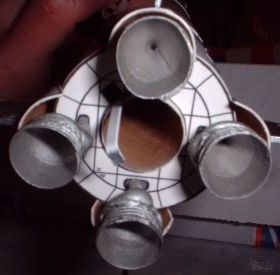
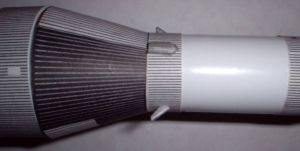 At this point,
you could stick on a few USA/flag decals, call it quits, and still have one of
the coolest looking little Saturns anyone has ever seen. For the type-A
rocketeer though (and aren't most of us type A's?), there are several little
wood dowels and scrap pieces of balsa that are used to form details. The
details include 6 cable tunnels, 5 LOX tunnels, 2 A-IVB APM's, 4 S-II ullage
motors, and 2 S-IVB ullage motors. These really set this kit apart.
At this point,
you could stick on a few USA/flag decals, call it quits, and still have one of
the coolest looking little Saturns anyone has ever seen. For the type-A
rocketeer though (and aren't most of us type A's?), there are several little
wood dowels and scrap pieces of balsa that are used to form details. The
details include 6 cable tunnels, 5 LOX tunnels, 2 A-IVB APM's, 4 S-II ullage
motors, and 2 S-IVB ullage motors. These really set this kit apart.
The recovery package is effective but not exactly matching the quality of the rest of the kit. As the Dr. Zooch ant boats in the instructions, "a trash bag plastic parachute with bullet proof shrouds" (Kevlar® lines). The 15" chute uses tape disks for attaching the lines and a snap swivel on the other end. I'd really like to see a mylar chute or at least some other color than white. The elastic shroud line is anchored using the classic tri-fold paper inside the BT-60 tube.
Finishing:
Since virtually all the finishing is done through wraps, there's very little
effort needed to finish this, other than applying a few waterslide decals and
touching up a few details.
Construction Rating: 4 out of 5

Flight:
One caution on the flight prep for this kit (and similar rockets): since the
motor tube extends all the way up into the upper body tube where the chute
goes, it is a good idea to poke some wadding or dog barf into the motor tube
before loading the motor. Packing it into the body tube from above results in a
loose fit and the contents could shift around in flight, resulting in a melted
chute.
After waiting almost two months for a break in both the weather and my schedule, I finally got a nearly perfect day to sneak out and fly a few of my winter builds. On a clear day with 4-6 mph winds, I flew this one twice.
First flight was on a C6-5. It flew straight up, spinning just a couple of turns on the way up (the roll patterns make this easy to track). Ejection was just a bit late but otherwise fine. It goes surprisingly high on a C, topping out around 600-700 feet.
The white plastic chute worked fine, though if using a garbage bag chute I'd at least prefer a dark one rather than white, which can be lost in the clouds a bit. I was amazed to recover with no damage to the fins, nozzles, or tiny details anywhere.
Second flight was on a C6-3, which turned out to be a bit early. Either motor in my opinion would be fine for this kit. Flight #2 also came back without a scratch.
Recovery:
PROs: Excellent flights, can run on cheap motors, and details are tough enough
to withstand repeat flights.
CONs: Chute is not exactly durable and white is poor color choice for it.
Flight Rating: 5 out of 5
Summary:
I am extremely pleased with this kit. It's a terrific combination of detail and
scale-like accuracy, while still being very inexpensive and flies great.
Overall Rating: 4 out of 5
 |
 |
Flights
 |
 |
Zooch (March 8, 2005)
 |
 |
T.D. (March 6, 2005)